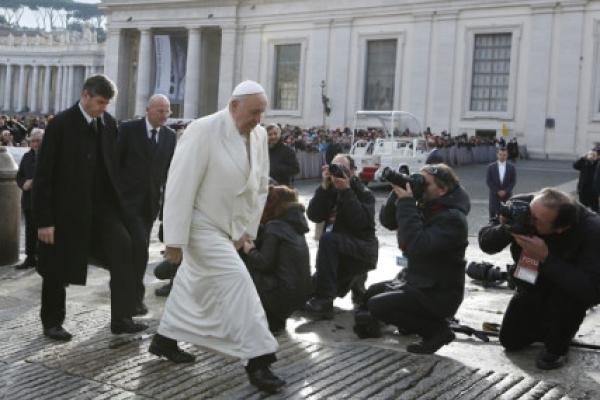When cardinals gathered in the Sistine Chapel a year ago to choose a successor to Pope Benedict XVI, a frail 85-year-old who had become the first pope in six centuries to resign, many of them had one non-negotiable for the next pontiff: that he not be over 70 years old.
So what did the cardinals do? They elected 76-year-old Cardinal Jorge Bergoglio of Argentina — a man who had part of a lung removed in his 20s and who today “walks kind of crookedly,” as a former aide once put it, because he wears orthopedic shoes to help alleviate chronic lower back pain.
All in all, though, Pope Francis, now 77, seems to be doing quite well at the one-year mark of his papacy, despite maintaining a nonstop pace of liturgies, meetings, public appearances, and hours of prayer throughout a day that starts before 5 a.m.
“He eats works, it’s true,” said the Rev. Antonio Spadaro, a Jesuit priest — like Francis — who conducted a book-length interview with the pope last year and knows him well.
It seems like an eternal winter here in Detroit. The Associated Press, citing a National Weather Service analysis, reports Detroit is experiencing the most extreme winter of any city in the country. I don't know about that, but this winter is "getting real up in here."
At Holy Redeemer, the church just north of Detroit where I serve as pastor, the weather has impacted 9 of 12 Sundays since Dec. 15. It's hindered our ability to gather for worship, dented budgets, and made it hard to maintain community.
You can set your watch by the storms that arrive late on Saturday night and clear by Sunday afternoon.
Yet, time and again the congregation at Holy Redeemer manages to surpass my wildest expectations of faithfulness.
For most folks, these names will not mean much: Eric Pizer, Christopher Barber, and Andrew Harris.
They are names that may have a bit resonance in Wisconsin, where I am from. What they represent, though, are the struggles we face as a society dealing with concepts of repentance and redemption. They represent the way those concepts get overrun by politicians seeking to exploit the public’s fears. We as a people, after all, do not seem to be in a very forgiving mood these days.
So the distinctive stories of these three Wisconsin residents might offer a good starting point for Christians thinking about what our faith tradition calls us to during this season of Lent.
It baffles me when people who are deeply concerned about peace and peacemaking define themselves as “spiritual but not religious.” In pursuit of personal and/ or global peace, they shun organized religion in favor of indigenous spirituality. Celtic music, eastern spiritual disciplines like yoga and meditation, and the Native American relationship with nature all seem so attractive and obviously non-violent. I actually have nothing against any of those expressions of spirituality – allow me to offer as proof the trip my husband and I will be taking in July. We will be touring Northern Ireland to enjoy the “storytelling, music, art and peace” of Celtic culture “ancient and new. Great food, inspiring art, and beautiful journeys on foot will form the heart of this soulfully unique and transforming experience.” Sounds great, doesn’t it?
Normally this sort of description would not entice me. It sounds vaguely new age-y, all too “spiritual but not religious.” So why am I going? Because one of the tour leaders is my friend and brilliant cultural critic, the founder of the Wild Goose Festival, Gareth Higgins. Gareth understands that alternative forms of religiosity and spirituality are a necessary part of the revival of Christianity that is going on today, but he also understands that without “religion,” the pursuit of peace is at a serious disadvantage.
I am aware that such a claim runs counter to the primary reason many people give for being spiritual but not religious. They blame religion for violence and war, and there is no denying that many people have killed in the name of their beliefs. Somehow those who abandon organized religion believe that the cure for violence is to purge themselves of religious texts and doctrines that have any reference to violence in them. Why read the Old Testament or believe in a God who requires the death of an innocent victim to be reconciled to us? How could that possibly lead to a more peaceful world?
“Jesus was led by the Spirit into the wilderness to be tempted by the devil.”
Thus begins the spiritual drama of Lent, the forty days before Easter that commemorates Jesus’ wilderness experience. No human, not even Jesus, can escape the temptation of the devil.
Just before Jesus was led into the wilderness, he was baptized in the Jordan River by John. As the Gospel of Matthew reports, when Jesus emerged from the water “a voice from heaven said, ‘This is my Son, my Beloved, with whom I am well pleased.’”
Jesus’ identity as God’s Son had always been true, but he received confirmation of his relationship with God at his baptism.
A call for greater acceptance of gays and lesbians has put African and Western churches on a collision course, as some African clerics liken mounting criticism from the U.S. and Europe to a new wave of colonization by the West.
“Homosexuality is equivalent to colonialism and slavery,” said one participant.
“We feel it’s like a weapon of mass destruction,” said another.
“It is not biblical and cannot bring blessing to Christians,” said a third.
Gitonga, a powerful East African Pentecostal church official, is among a group of Kenyan leaders who have launched “Zuia Sodom Kabisa,” Kiswahili for “Stop Sodom Completely.” The campaign seeks 1 million signatures to petition legislation to criminalize homosexual acts in Kenya.
Atheists are challenging plans to include a 17-foot, cross-shaped beam that became a famous symbol of Ground Zero after 9/11 in a display at the national memorial museum that is scheduled to open this spring.
Last year, a lower court rejected a lawsuit filed in 2011 by the New Jersey-based American Atheists that said the cross was an unconstitutional establishment of religion.
In his appeal, Kagin said his organization is seeking a similar object to be displayed at the museum, something like a plaque that would say “atheists died here, too.”






